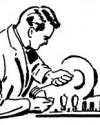 To illustrate how priceless it is - let us suppose there was some force
that could take radio away - could completely wipe out radio in the
world. What would it be worth to have a group of men rediscover and
redevelop that intangible something? The something which makes it
possible to take a few pounds of material and a few hours of work and
with it be in contact with almost any place in the world.
To illustrate how priceless it is - let us suppose there was some force
that could take radio away - could completely wipe out radio in the
world. What would it be worth to have a group of men rediscover and
redevelop that intangible something? The something which makes it
possible to take a few pounds of material and a few hours of work and
with it be in contact with almost any place in the world. As purchasers, we see the finished article - the automobile, the radio,
the telephone, the airplane or the Diesel locomotive. But how did they
come about?
As purchasers, we see the finished article - the automobile, the radio,
the telephone, the airplane or the Diesel locomotive. But how did they
come about?
You have heard a great deal about science,
research and engineering. But for every experiment that has been a
success, there have been thousands of failures, much discouragement and
sleepless nights. Long hours have been spent in just thinking about and
experimenting with these developments. If that work had not been done,
man would not be flying. We would have no electric lights, no
motorcars, nor could you now be listening to this great orchestra. |








